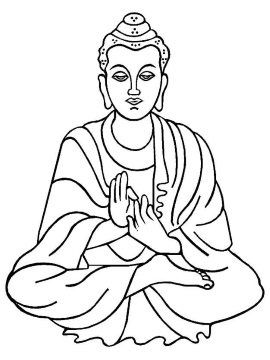Buddhism
Largely unchanged from its Earthly roots about 500BCE when its founder, Siddhartha Gotama who was also known as "The Buddha", was awakened. Like their namesake, Buddhism, with nearly half a billion followers across The Extent is synonymous with "Awakening" or "Enlightenment". Buddhists do not believe that their founder is a god and do not worship him or idols of him but they do pay respect to images of him. They also believe that they will one day reunite with him on Karma when the galaxy is finally at peace with itself.
 To many of its followers, Buddhism is more of a philosophy, a way of life, than a religion and it tells them to lead a moral life, to be mindful and aware of their thoughts and actions as well as to develop wisdom and understanding. Many Buddhist communities are relatively poor because Buddhism teaches that wealth is not the key to happiness and cannot be permanent.
There are Four Noble Truths in Buddhism:
To many of its followers, Buddhism is more of a philosophy, a way of life, than a religion and it tells them to lead a moral life, to be mindful and aware of their thoughts and actions as well as to develop wisdom and understanding. Many Buddhist communities are relatively poor because Buddhism teaches that wealth is not the key to happiness and cannot be permanent.
There are Four Noble Truths in Buddhism:
 To many of its followers, Buddhism is more of a philosophy, a way of life, than a religion and it tells them to lead a moral life, to be mindful and aware of their thoughts and actions as well as to develop wisdom and understanding. Many Buddhist communities are relatively poor because Buddhism teaches that wealth is not the key to happiness and cannot be permanent.
There are Four Noble Truths in Buddhism:
To many of its followers, Buddhism is more of a philosophy, a way of life, than a religion and it tells them to lead a moral life, to be mindful and aware of their thoughts and actions as well as to develop wisdom and understanding. Many Buddhist communities are relatively poor because Buddhism teaches that wealth is not the key to happiness and cannot be permanent.
There are Four Noble Truths in Buddhism:
- That life is suffering and includes pain, disease, ageing and that we will die.
- That suffering is caused by craving, that is to say, a Buddhist should not try to get others to be like them or to want things since getting what one wants does not guarantee happiness indeed deprives one of contentment and happiness.
- That suffering can be overcome and happiness attained, a state known as Nirvana. Nirvana is possible if one stops craving and learns to live day by day which gives one more time and energy to help others.
- The Noble 8-fold Path leads to the end of suffering by being moral in words, deeds and work, being aware of our thoughts and actions, by understanding the Four Noble Truths and by being compassionate to others.



